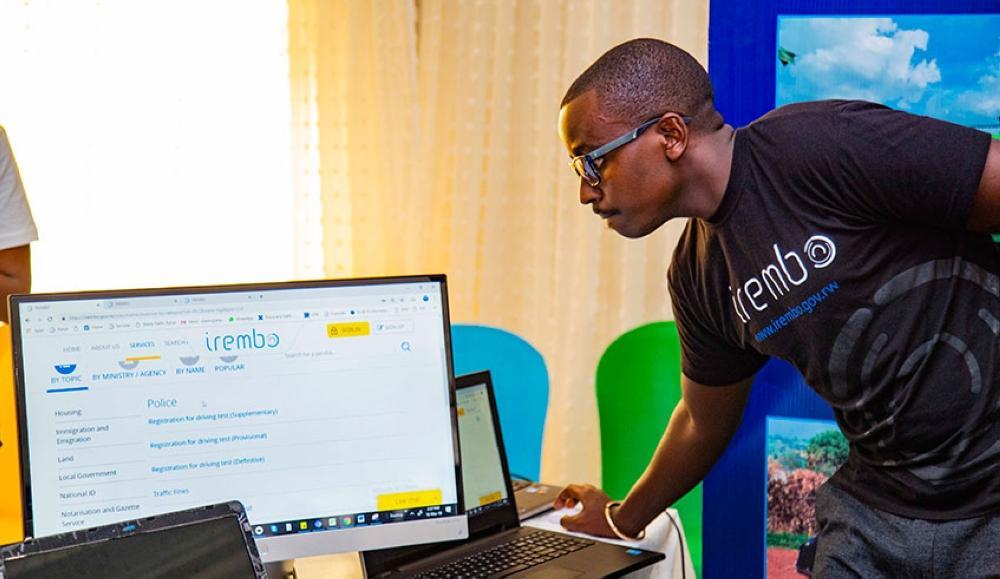Africa-Press – Rwanda. The government is planning to simplify access to public services by eliminating unnecessary document attachments in applications submitted through IremboGov, the country’s e-governance platform.
This follows concerns raised by members of parliament during their recent outreach visits, where citizens cited the need to upload multiple supporting documents as one of the biggest challenges in accessing government services online.
Lawmakers noted that such requirements contradict the government’s ongoing digital transformation agenda, which seeks to phase out paper-based processes and achieve full end-to-end digitalisation.
Appearing before the plenary sitting of the chamber of deputies on November 4, the Minister of ICT and Innovation, Paula Ingabire, said there is an ongoing reform; which aligns with the national “Zero Trip, Zero Paper” initiative; to make government services entirely digital and data-driven.
According to her, the government is currently reviewing all 240 public services offered through Irembo to identify how they can retrieve the needed data from other government databases without requiring applicants to upload attachments.
“We are working to remove unnecessary attachments so that when a person applies for a service, the system itself retrieves the required information instead of asking the user to upload documents,” Ingabire explained. “This will not only simplify the process but also eliminate the need for people to travel long distances just to scan papers.”
She added that the government is strengthening efforts toward end-to-end digitalisation, ensuring that citizens can complete applications entirely online without manual intervention.
To further enhance user experience, she explained that Irembo will soon introduce a mobile application, allowing users to apply for services directly from their phones. The app will require applicants to input only key information, while the system will automatically fetch any missing details.
However, despite notable progress in internet penetration; currently at 87 percent; only about 40 percent of Rwandans are actively using digital platforms to access services.
To address the gap, Ingabire revealed that the government plans to expand the network of digital ambassadors, who assist citizens in navigating online services. The number will increase from 1,900 to at least 2,148, ensuring there is one ambassador per administrative cell.
“If resources allow, we plan to raise this number to 10,000,” she said. “We are also promoting device financing schemes, particularly for people with disabilities and students.
“Through our partnership with Airtel, over 1.2 million smartphones have already been distributed at subsidized prices of Rwf 20,000 instead of Rwf 80,000,” she noted.
During the session, lawmakers also emphasized the need to make Irembo services more mobile-friendly, especially for officials who verify documents remotely.
MP Erneste Nsangabandi noted that some government systems, such as the social registry and the integrated electronic case management system (IECMS), still require heavy file uploads that are difficult to process on mobile devices.
He suggested making it possible for authorised personnel to approve documents from anywhere using phones.
MP Egide Nkuranga raised another concern, warning that interlinking multiple government systems could increase exposure to cyber security threats.
In response, Minister Ingabire assured lawmakers that data-sharing protocols are strictly protected.
“No system pulls data directly from another,” she said. “Information is exchanged through secure channels. As hackers grow more sophisticated, we are also strengthening our defences and ensuring that all critical systems undergo regular audits; at least once a week.”
According to MINICT, more than 3,000 public officials across different institutions help monitor and process requests submitted through Irembo. The time it takes for citizens to receive services has already dropped thanks to system upgrades and better coordination.
Ingabire said each ministry now has a Chief Digital Officer tasked with harmonising ICT systems, improving data sharing, and monitoring performance.
She added that the government is also developing a monitoring and data sharing policy system to ensure consistent updates and collaboration across institutions.
“We are reviewing existing systems in health, education, and agriculture to make them more integrated,” she added. “In the near future, every patient will have a single electronic medical record, and smart systems in agriculture will link farmers directly to digital support services.”
The minister also mentioned ongoing efforts to upgrade tax systems, LAIS (Land Administration Information System), and strengthen their capacity to handle peak demand periods, such as during health insurance renewals for Mutuelle de Santé.
Although Irembo experienced only 37 hours of downtime over the past year, Ingabire said the goal is to reduce technical interruptions even further.
“Ideally, a system should not remain down for more than an hour,” she noted. “And when it does, there should be a clear communication mechanism to inform users.”
Since its launch, Irembo has become Rwanda’s leading digital public service platform, allowing citizens to request key documents such as birth and marriage certificates, pay for health insurance, track fines, and complete various government transactions online.
Available in Kinyarwanda, English, and French, it supports all major payment methods and continues to serve in the country’s digital transformation.
For More News And Analysis About Rwanda Follow Africa-Press






